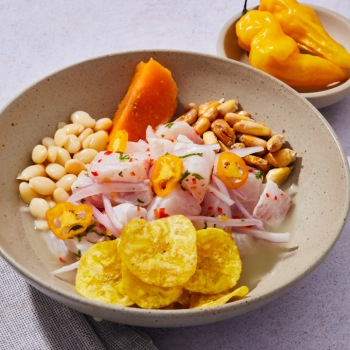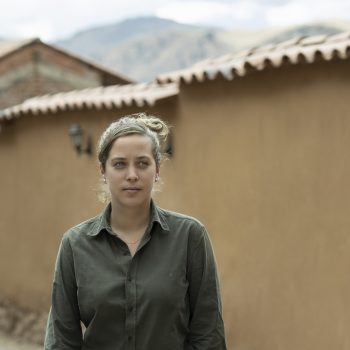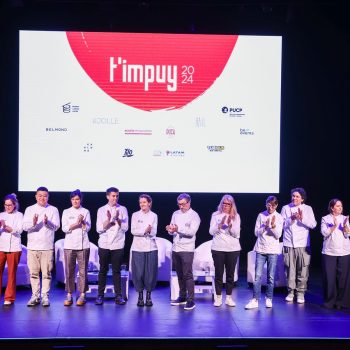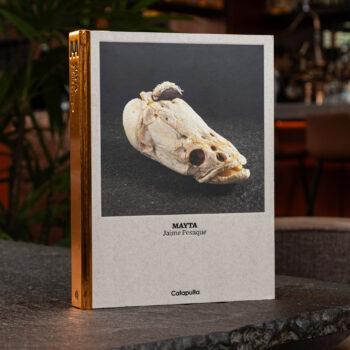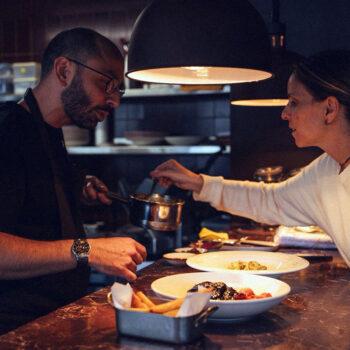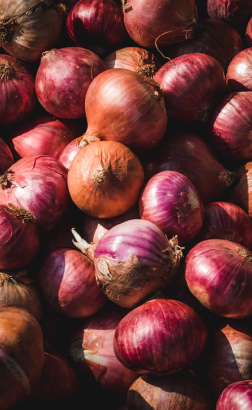Escribe Paola Miglio / Foto Portada Jimena Agois
Conversamos con Virgilio Martínez, uno de los exponentes más sólidos de la cocina de América Latina y del mundo. Hablamos sobre la “alta cocina”. ¿Está destinada a desaparecer? También sobre lo rápido que íbamos, la ausencia de reflexión, las exigencias, los cambios, la reinvención. Porque si es necesario se vuelve a empezar y se encuentran nuevas formas.
¿Cómo cambia con los años aquello que llamamos alta cocina? La alta cocina surge en escenarios donde el disfrute, la calidad de los productos, el servicio, todo, tenía el nivel más alto, la excelencia, la experiencia de las formalidades, del protocolo, eso que nace en Francia con chefs, equipos de sommelier y el vino. La alta cocina entonces se podía ver de muchas formas, pero se confunde con un solo formato de restaurante, el del mantel largo. Ahora ya no, es disruptiva. Claramente ha evolucionado, nos liberamos, encontramos nuevas maneras de comunicarnos y somos más abiertos en nuestras propuestas y formas de pensar. La experiencia incluye otro tipo de lenguaje, está muy ligada al precio pues termina siendo no cara sino costosa por las mismas herramientas. En nuestro escenario hay un discurso, un mensaje y una verdad: , la naturaleza, lo tradicional, lo coherente y solidario, y ahora más que nunca se trata de ser sostenibles. Los precios se elevan, y eso porque la búsqueda significa más recursos, más colaboradores interdisciplinarios, empleados, más trabajo y viajes de investigación, ingredientes que no se ven en la carta pero que sí se reflejan en ella. El costo por pagar es que el público local se aleja y llega el de fuera.
El concepto de lujo se transforma. Ya no es más champán y caviar. Siempre hubo lujo. Para nosotros el lujo es encontrar la mejor forma de acercarnos a nuestro territorio. Hay que tener en cuenta también que Perú no tiene más de 20 años en esto y tendrá unos 10 de haberse consolidado y empezar a compararse con el mundo en alta cocina. El concepto de lujo cambia mucho por la tendencia a lo natural. Pagas por cosas que hacen sentido y la gente tiene más información, los “foodies” (aunque el término no sea el mejor visto) buscan vivir esa experiencia. Que sepas o no de cocina es independiente a las ganas de sentir que has pasado un momento increíble. No, no soy una persona que busca el champán y el caviar, la foto clásica del lujo, pero sí que busca autenticidad y coherencia servida por una serie de personajes apasionados que brindan detalles y sorpresas, cuidado. Me gusta tener un espacio donde puedas reírte, donde podamos enseñar desde la humildad, compartir conocimiento y que puedas ser escuchado y ser parte de él, aprender. En el mundo de la alta cocina se han abierto tantos campos y tantas verdades que cada uno tiene la suya. A mí, como cocinero, me gusta gente con mente abierta que se entrega y es cómplice, que expresa si no le gusta. Y los más críticos son los que trabajan aquí y forman parte del equipo: están tan empapados en su artesanía y en su arte que tiene que ser lo más autocríticos.
Íbamos a mil revoluciones: consumíamos gastronomía con los ojos. Premios, viajes, congresos, menús degustación. ¿En qué momento se paraba uno a reflexionar? Para quienes estábamos metidos en el mundo de la gastronomía, hemos llegado a creer que los restaurantes eran los espacios donde sucedían las cosas y que eran un reflejo de lo que se estaba viviendo. Como antes se decía que lo que pasaba en los mercados era el reflejo de lo que pasaba en la sociedad. Creo que en los últimos tres años hemos vivido a mil por hora, pero esto también ha pasado en otras actividades. Hubo mucha competencia, mucho narcisismo. Incluso hoy puedes vivir (observar) una experiencia de alta cocina entera desde tu teléfono. Había gente que consideraba y considera que ver a un chef es un lujo.
¿Perdimos el foco? De repente al ir a toda velocidad y meterte un parón nos hace ver lo inútiles que hemos podido ser ante ciertas situaciones y lo malos gestores. Es muy fácil encontrar errores en otros y en uno mismo. Y tú mismo tenías que dar la talla, por la competencia, a pedido de tu público o de tus trabajadores. Se vivía un gran momento de atención y de presión, en una sociedad en la que el consumo iba al máximo y lo realmente importante se empezaba a dejar de lado. Hablamos de tanta desigualdad y esto se puede reflejar en la gastronomía. Estamos en un momento en que podemos ver errores. A futuro, no todo necesariamente va a redireccionar para beneficio de todos, como quisiéramos. Vivimos en un mundo tan capitalista y obsesivo por consumir que ha llevado a los restaurantes a donde estamos, al desborde de relacionistas públicos, a trabajar sobrehoras. Se han hecho cosas mal y no es que no supiésemos que se estaban haciendo cosas mal, lo que pasa es que no se decía o no se quiere decir.
¿No sientes que es una metáfora muy poderosa ver a grandes chefs del mundo de la alta cocina haciendo pasta con tuco en sus redes sociales? Cada uno conoce su audiencia. Y la verdad en estos momentos, cuando tantas cosas pasan a la vez, creo que cada cocinero empieza a escoger su camino. Tiene una audiencia mundial y lo quieres ver haciendo una pasta, pues que la haga. Eso de haber endiosado chefs y hacerlos rockstar es demasiado superficial y lo estamos combatiendo. Dentro de mi posición, no puedo ser lo que tú quieras, hay que ser consecuentes con una crisis y no me puedo poner a rallar trufas en un video, en mi casa en Barranco, frente al atardecer, cuando los rockstar son los médicos y los policías que se la juegan en primera línea sin descanso. Cada uno con su realidad, estoy afectado y pensando en cómo regresar con mi equipo, pagar las cuentas, buscando todas las opciones rentables y hacerlo de forma inteligente para que Central pueda volver pensando que va a ser mejor. No quiero un Central a medias. El mundo va a buscar más de lo que hacemos y por eso le veo mucho futuro. Lo que sucede también en todo este tiempo permitimos que la gente hable de más, que los periodistas, los “foodies”, los influencers exageren las cosas, quién no ha vivido esa vida de exageración. Nos hemos vuelto medio bestias, dejamos que se exageren nuestras imágenes y nuestros restaurantes. Ahora toca estar pendientes. Dar la cara a mis cocineros, a todo el mundo que me cruzo, escuchar.
Esta pandemia los ha hecho parar a todos. Ha sido un baño de humildad para el mundo gastronómico. ¿A dónde apuntar ahora? Se busca la fortaleza, ajustar números y sobrevivir con la mejor calidad y salud para el equipo. ¿Cuántos vamos a quedar vivos? Estamos justo hablando de un mundo más solidario, donde se impulsen los valores, donde tu cocina tenga calidad. La alta cocina se vale de todas estas ideas, pero tienes que trabajarlas. El interés, la pasión, tu arte, pueden venir de todos los lados, tu intuición. Eso es lo que va a transcender en la región. Porque la alta cocina es competitiva: la realidad es que tienes que moverte, vivir al día en crisis, es desgastante, no ves a tu familia, a tu pareja, a tus hijos. Se quiso relajar con los conceptos casuales, se decía que era el siguiente fine dining; pero lo cierto es que la alta cocina es uno de los mejores lugares para ver la calidad y los estándares, donde se pone a prueba si lo que haces y dices es coherente. En la región, en el mundo, si quienes manejaban este sector no lo hacen, otros lo harán, habrá cambio de dueño o de líder. Pero alguien lo va a seguir haciendo.
En Perú, en Latinoamérica, en el mundo, veo a gente defendiendo sus casas. Somos gente que lo único que sabe hacer es esto y somos tercos. Y vamos a tener que rediseñar, atraer gente a nuestros restaurantes y pensar como empresarios (hacer números), comensales y cocineros. Teníamos una responsabilidad, la gente te la da y la vas asumiendo, y no es soberbio. Está bien que te la creas. Y más hablando de Latinoamérica, porque empezamos a ser un destino potente. La innovación estaba un poco atorada y entonces aparecían estas cocinas que de modo natural revelaban recetarios desconocidos, biodiversidad. Los restaurantes empezaron a ser atractivos para el mundo, la gente viajaba para comer en Boragó en Santiago, luego venía a Central, luego se iba a Leo en Bogotá. Lo que sale de esta crisis es experiencia, entender que cometimos errores y aprender de ellos; fortaleza mental, emocional, capacidad de trabajo, liderazgo, sentido de trabajo en comunidad, entender que Ciudad de México no tiene que competir con Lima por ser el destino más “hot”, cuando Latinoamérica es el destino.
La cocina como transformación y la posibilidad de recuperarla es una forma de restaurar el balance en nuestras vidas. En un mundo ideal sería lo mejor, pero después de esta crisis, de la que ojalá salgamos rápido con salud física mental y fortalecidos. Vamos a regresar a trabajar con otras direcciones y habremos aprendido algo. No creo que la alta cocina pare, se enganchará de igual manera, pero vamos a encontrar otros caminos y la exigencia será la misma. Asumir estas responsabilidades, visibilizar mejor otros objetivos relacionados a nuestras acciones.
¿Toca ahora ser responsables o sostenibles? La palabra sostenible es tan amplia, me refiero mucho a tu negocio, a sostener tu coherencia y lo que le quieres transmitir al público. Es eso. Tener tu restaurante cerrado tres meses y luego de la crisis, tiene que ver con la coherencia y qué tan fiel eres. Debemos ser responsables y cuidar a nuestros equipos. Acá somos 110 personas, lo que pasa en sus cabezas y sus mundos es muy particular.
Hoy comer es un acto político más que nunca. Dónde comprar, qué comprar, qué elegir. Usar sobras, recalentar, cocinar en casa. Tomar conciencia de lo que significa volver a los fogones. La cocina de investigación, la alta cocina, ya sea histórica, antropológica, de rescate de insumos, de territorio, está basada en una cadena de productores, ¿Cómo tratar de no romperla en estos tiempos? Más que nunca, todo lo que haces y dices es un acto político. Ya se entiende que es así. Es súper difícil. En Mil (Moray, Cusco) estamos en una cosecha de 150 variedades de papa y no sabemos qué va a pasar, esto involucra 300 familias de dos comunidades. Es complicadísimo y tienes un equipo de trabajo que tiene ilusiones. Habíamos encontrado un camino para relacionarnos con el entorno y empezar con algo, y seguimos tratando de que funcione. Nos cuesta y no dejamos de estar comunicados.
¿Crees que son necesarias políticas públicas para fortalecer estas alianzas en toda la cadena restaurantera? Para que el pequeño productor no quede desprotegido.
Y ahí también está el nuevo lujo, eso se reconoce ya en la alta cocina, cocina que alimenta y que es medicina, es de conocimiento público. Estar más informado de lo que comes, el privilegio de tener acceso a estos productos es un lujo. Sí creo que el gobierno tiene que involucrarse mucho más, ha hecho promociones turísticas y todo muy aplaudido, pero se había tomado como campaña y tenía tiempo de caducidad. Los cocineros nos hemos puesto a disposición de que existan organizaciones que protejan tierras y denominaciones, no en formato europeo, sino entre nuestras culturas. Siempre se ha pensado que la exportación era el camino, cuando es el bienestar del propio campo y oportunidades para que los productores puedan llegar a todos respetando su cultura. Un restaurante tiene que tener un compromiso social y asumirlo, pues las desigualdades e injusticias son muy evidentes y sino lo haces real, hoy es muy fácil que se haga visible. Que las cosas sean complicadas no debería ser la respuesta.
¿Cómo te has comprometido con tus restaurantes? En Lima, Kjolle tiene más aceptación local. Vamos a hacer una carta más grande. Estará el menú degustación con carta. Central queda igual. Cuando trabajas y llegas a algo que es tan interesante, no hay vuelta atrás. No sé hacer delivery, no soy competente y no se puede. Nos hemos enfocado en hacer experiencias que te hagan ver este tema interdisciplinario. Pero en Kjolle sí y eso nos cae fantástico. Mil, en Cusco, por el momento queda cerrado; y Mayo (el bar) va a ser un restaurante con una carta amplia y casual. En eso estamos trabajando con el equipo, en hacerlo súper accesible. El casual que nunca hicimos, lo haremos ahora en Mayo. Retomaremos los Mater Café, porque si hay algo que tenemos que hacer es devolver lo aprendido a la comunidad y muchos de nuestros colaboradores del mundo del arte la están pasando mal, quienes hacen cerámicas, arquitectura, muebles, se están quedando sin espacios. La idea es que el área de Mater Iniciativa (proyecto de investigación gastronómica que sostiene al grupo de restaurantes) brinde los espacios y nos pongamos a disposición de quien quiera mostrar su arte, que esta comunidad demasiado talentosa no se diluya y que no se apague la ciudad. Todo será implementado de a pocos, según lo que dispongan las autoridades. Las cosas están cambiando todos los días.
¿Y las aperturas en Moscú y Tokio?
Tenemos dos equipos para Moscú y Tokio que estarán trabajando a fines de este año.
Así como se habla mucho de sostenibilidad, se habla también de estacionalidad y temporalidad. ¿Cómo tomar en Perú estas palabras hoy? Los climas son distintos en las diversas regiones, los ecosistemas variados, las estaciones no definidas. La temporalidad del hemisferio norte no es aplicable, si vas más al sur, puedes ver temporadas más marcadas. Pero nosotros funcionamos diferente. En un mes comienza la cosecha de papa y si no hay papa después, la hacemos chuño. Pero ojo, que esto no es un salvoconducto para que uses lo que quieras cuando quieras. Aquí también se han cometido errores: como todo pasaba en Lima y llegaba de todo, eso nos dio mucha seguridad y pensamos que nunca que se iba a acabar y en el mar, la depredación es evidente. Es muy complejo. Y te juzgas y te juzgan. En lo que más tenemos que creer es en tu contexto y en tu ecosistema. No renunciar al mundo, pero mantener tu identidad, eso te hace más poderoso en tu trabajo
El año pasado, en la conferencia que diste en Ñam Bolivia en La Paz, dijiste que había que crear nuestras propias reglas, que nuestra biodiversidad, nuestra cultura, nuestras tradiciones como región latinoamericana nos permitía hacerlo. ¿Es el momento? Hace rato que mucha gente que trabaja, no solo en restaurantes sino en la agricultura, lo ve como la mejor opción. Alimentarse como se vivía antes y de acuerdo con nuestras riquezas, condiciones, climas y temporadas. Se nos han impuesto muchas cosas por una naturaleza de conquista, pero somos libres y no todo lo que viene de Europa o Asia es aplicable en la costa, en los andes y en la Amazonía. Tenemos que entender nuestra historia y contradicciones, trabajar en base a nuestra identidad.
¿Crees que hoy se necesita mas creatividad que nunca? Sí. Esta crisis nos ha sacado de la zona de confort y es un motor de creatividad. Nos pone en una situación en la que hay que ganarle y sacar de ahí una oportunidad para hacer las cosas mejor. Esta generación se la esta tomando a pecho. No veo indiferencia.
¿Cuales crees que son los valores que van a quedar en la industria? Espiritualmente, un inventario de las cosas que no hemos hecho bien. La soberbia la vamos a dejar de lado. Existimos solo como comunidad, deberíamos seguir trabajando como comunidad. Este término también se ha usado mucho y cuando conviene, ahora está claro que debemos darle el valor y el sentido que posee. Buscamos un compromiso social, algo que no veíamos tan real; tenemos el tiempo para rediseñar nuestras propuestas y hacer una cocina más inteligente que abarque todas estas cosas que sabemos que podríamos hecho mejor, llegar a más gente, tener más empatía. Y sigo pensando que en todo momento la cocina es arte. Ya no lo debato. Porque quienes creemos que salimos de esto con nuestros restaurantes estamos siendo tercos y soñadores. Estamos en una etapa en la que debemos seguir nuestra intuición, vivimos tanta incertidumbre que la intuición le puede ganar a la razón. Hazle caso.
¿Sientes que tienes un compromiso con la industria gastronómica local y latinoamericana? Sí, cuando tengo que hablar con gente de México, Argentina o con cocineros jóvenes, profesores que me cuentan sus realidades, me piden tips, ayuda. Sí, siento que tengo que dar, es normal que me llame un chico que recién comienza cuando ya tengo 20 y tantos años en cocina y he pasado por tantos cierres y aperturas. Creo que puedo aportar, mientras no sea a nivel de show. Está bien. Pero hay que ser muy cautos, porque las movidas que realices pueden ser vistas como oportunismo. La imagen del chef rockstar, que resuelve los problemas filosóficos… no, estamos lejos de eso; pero comunicar, informándonos, educándonos, ahí podemos aportar. Como chefs, no nos podemos atribuir la idea de cambiar el mundo todos juntos.
VIRGILIO MARTÍNEZ, FINE DINING IN TIMES OF CRISIS: “THOSE OF US WHO BELIEVE THAT WE ARE GOING TO COME OUT OF THIS CRISIS WITH OUR RESTAURANTS INTACT, ARE BEING STUBBORN AND DREAMING”
By Paola Miglio / Translation Alejandra Arrarte
We spoke with Virgilio Martinez, one of the most respected advocates of Latin American and global cuisine, about ‘fine dining,’ and whether it is destined to disappear. We also talked about the acceleration of the human experience, the absence of reflection, demand, changes, and reinvention. If it is necessary, one begins again and finds new forms of expression.
How has what we call fine dining changed over the years?
Fine dining emerged in scenarios where pleasure, the quality of the products, the service – everything – was at the highest level; the excellence, the experience of dining formalities and protocol – that is born in France, with chefs, sommelier teams, and wine as core to the experience. Fine dining can thus be accessed in many ways, but often gets confused with only one restaurant format – that of the ‘long, white tablecloth’. But not anymore. It is disruptive. It has clearly evolved, we have liberated ourselves and have found new ways to communicate. Our proposals and ways of thinking are more open. The experience now includes another type of language. It is very much tied to its cost – it is not expensive, rather, it is costly because of the very tools used for its execution. Within our scene there is one conversation, one message, and one truth: the natural, the traditional, the coherent, supportive, and now more than ever we try and be sustainable. The prices go up, and that is because the search calls for more resources, more interdisciplinary collaborators, more employees, more work and investigative travels – ingredients that are not listed on the menu, but are nevertheless reflected in it. The price we pay for that is that the local public moves away and the foreign public arrives.
The concept of luxury has transformed. It is no longer champagne and caviar.
There was always luxury. For us, the luxury is in finding the best way to connect with our territory. It is important to consider that Peru has been in this for barely 20 years, and has been a consolidated a player in the world of fine dining for maybe 10. The concept of luxury has changed significantly as a result of the shift towards the natural. You pay for things that make more sense and people have more information, the foodies (even though this term is not always popular) look for that experience. Whether or not you know about cuisine is separate from the desire to feel like you have experienced an incredible moment. No, I am not the kind of person who looks for champagne and caviar, the classic picture of luxury, but I do look for authenticity and coherence served by passionate people who provide surprises and gestures, care. I like having a space where one can laugh, were we can teach from a place of humbleness, share knowledge, be heard and be a part of it, where you can learn. In the world of gourmet dining there are so many fields and so many truths, each person has their own. For me as a chef, I like people with open minds who dedicate themselves and work with you, who let you know if they don’t like something. And those who work here and form part of the team are the most critical: they are absorbed by their craft and in their art, and they must be self-critical.
We were going at full speed, consuming gastronomy with our eyes. Awards, trips, conferences, tasting menus – at what point could one stop and reflect?
For those of us who have been immersed in the world of gastronomy, we have begun to think of restaurants as the places where things happen and that they are a reflection of the world. Just like before, when it was thought that market places were a reflection of what was happening is society. I think that in these last three years, we have been living at full speed, but not just in the gastronomic world. There has been a lot of competition, a lot of narcissism. Now-a-days you can live (observe) an entire fine dining experience from your phone. There are people who considered – and who continue to consider – that watching a chef cook is a luxury.
Did we lose focus?
Perhaps being forced to stop after going at full speed has allowed us to see how useless we might have been facing certain situations and poor management. It is very easy to find the errors in others and in oneself. And you yourself had to be up to par – because of the competition, and by the request of your public and your workers. We were experiencing a time of great service and pressure in a society where consumption was at it maximum, and as a result, the actual important stuff began to get pushed aside. We talk so much about inequality, and this is reflected in gastronomy. We are at a moment in which we can see the mistakes. There is no guarantee that in the future everything will be redirected to benefit everyone as we may like. We live in a capitalist world, obsessed with consumption, and, as a result, restaurants have evolved into what they are now, overflowing with public relations people, working overtime. Things have been done incorrectly, and it’s not that we didn’t know we were doing things wrong, it’s that no one said anything or no one wants to say anything.
Don’t you feel like it is a very powerful metaphor to see the great chefs of the fine dining world making spaghetti with tomato sauce on social media?
Everyone knows their audience. And the truth is that in these moments, when so many things are happening at once, I think each chef begins to choose their path. They have a global audience and you want to see them making a pasta, well then they should do it. The tendency to deify chefs and turn them into rock stars is so superficial, and we are fighting against it. From where I stand, I cannot be what you want me to be, we have to be consistent within the construct of the crisis we are facing and I cannot film myself grating truffles in my house in Barranco, with the sunset as my backdrop, when the real rock stars are the medics and the police who are on the frontlines day in and day out. Each person must cater to their own reality. I am affected and I am thinking about how to get back to my team, pay bills, I’m brainstorming profitable options, and doing it intelligently so that Central can return in a better way. I don’t want a half-hearted Central. The world will continue to search out the kind of things we do, so I see a future in it. What also happened in all this time is that we allowed people to gossip about us; journalists, foodies, influencers – they all inflate things; who hasn’t been attracted to that flashy life? We got lost in it and allowed them to exaggerate our images and our restaurants. Now, it’s our turn to look after them. I have to face my staff, everyone I run into, I have to listen.
This pandemic has made everyone stop. It has been humbling for the gastronomic world. Where to aim now?
We are looking for fortitude, tightening numbers, and aiming for survival with the best quality and health for the team. How many of us will stay alive? We are talking about a world with more solidarity, driven by values, with quality food. Fine dining can fit in to all these ideas, but you have to work on them. The interest, the passion, your art, they can come from all sides, your intuition. This is what will transcend in the region. Because fine dining is competitive: the truth is that you have to move, live your day to day in crisis – it wears you down, you don’t see your family, your partner, your kids. There was a move to relax within the framework of more casual concepts. It was said that these were the “next fine dining”; but the truth is that fine dining is one of the best places from which to see quality and standards; where the coherence between what you say and what you do is put to test. In the region and in the world, if those who manage this sector don’t do it, others will – there will be a change of owner or leader. But someone will keep doing it.
In Peru, in Latin America, and in the world, I see people defending their homes.
As a group, this is all we know how to do, and we are stubborn. And we are going to have to re-design, to attract people to our restaurants and think like businesspeople (crunch numbers), diners, and cooks. We had a responsibility; people give it to you and you take it on, and it’s not arrogant. It’s ok for you to buy into it; and even more so when referring to Latin America, because we are becoming a powerful destination. Innovation was a bit a blocked and as a result, new cuisines appeared, which naturally revealed unknown recipes, biodiversity. Restaurants became attractive to the world. People would travel just to eat at Borago in Santiago, then they would come to Central, and then they would continue on to Leo in Bogota. What this crisis is giving us is experience – understanding that we make mistakes, and we must learn from them; mental and emotional strength, the capacity to work, leadership, the idea of working in community, understanding that the Mexico City doesn’t have to compete with Lima for the title of the “hot spot” when Latin America is the destination.
Is fine dining, as vehicle for transformation and the possibility of recovery, a way to restore balance to our lives?
In an ideal world it would be the best outcome, but after getting out of this crisis, hopefully quickly and stronger than before, with our mental and physical health intact, we will get back to work with new direction, having learned something. I don’t think that fine dining will stop, it will catch back on, but we will find new paths and the demand will be the same. We must assume these responsibilities and draw attention to other objectives related to our actions.
Must we now be responsible or sustainable?
The word sustainable is so broad. I am referring to your business, to sustaining your coherence and what you want to transmit to your audience. That’s it. Having to close your restaurant for three months, and then after the crisis it is all about coherence and how loyal you are. We must be responsible and take care of our teams. There are 110 people working here and what happens in each of their minds and worlds is unique.
These days more than ever before, eating is a political act. Where to buy, what to buy, what to choose. Using left overs, re-heating, cooking at home. To become aware of what it means to go back to the stove. Investigative cooking, fine dining – whether it be historical, anthropological, about rescuing local ingredients – it is all based around a chain of producers. How can one try to keep that chain from breaking in these times?
More than ever, everything you say and do is a political act. It is understood as such. It is very hard. At Mil (Moray, Cusco) we are amidst a harvest of 150 potato varieties and we don’t know what is going to happen; this involves 300 families from two communities. It is incredibly complicated and you have a working team that has hopes. We had found a way to relate to our surroundings and to begin something, and we are still trying to make it work. It is hard for us and we haven’t stopped being in communication with them.
Do you think public policies are necessary to strengthen these alliances throughout the entire restaurant network so the small-time producers do not continue unprotected?
And therein also lies this new luxury that is already recognized in fine dining, food that nurtures and that is curative, it is public knowledge. To be more informed about what you eat, the privilege of having access to these products is a luxury. I do think that the government has to get much more involved, they have done some very well received promotions, but these have been short-run, advertising campaigns. As chefs we have been willing to support the formation of organizations that protect lands and places of origin, not in the European format, but instead one that reflects our cultures. Everyone has always thought that exportation was the path for Peru, but it is the health of the land and providing opportunities for growers to reach consumers in a way that respects their culture. A restaurant must have a social commitment and must honor it. Inequalities and injustices are very evident and if you don’t fully commit, it is easy to see. Things shouldn’t have to be complicated.
How have you committed to your restaurants?
In Lima, Kjolle is more popular locally. We are going to expand the menu. There will be a tasting menu. Central will stay the same. When you work hard and arrive at something so interesting, there is no turning back. I don’t know how to do delivery, I am not competent and it cannot be done. We have focused on creating experiences that allow you to see the interdisciplinary theme. But at Kjolle yes, and that is fantastic for us. Mil, in Cusco, will stay closed for the time being; and Mayo (the bar) will become a restaurant with a casual and ample menu. This is what we are working on with the team – in making it super accessible. The casual project we never did, we will now do in Mayo. We will also resume the Mater Café, because if there is something we have to do, it is give back some of what we have learned to the community, and many of our collaborators in the art world are going through hard times; those who make ceramics, architecture, furniture – they are being left without spaces. The idea is that the Mater Iniciativa area (the gastronomic investigation project that supports the group of restaurants) provides the space, and that we open it to those who want to show their art so that this incredibly talented community doesn’t dilute and city’s creative light remains lit. All of this will be implemented little by little, according to what authorities allow. Things are changing every day.
And the restaurant openings in Moscow and Tokyo?
We have two teams for Moscow and Tokyo that will be working by the end of this year.
Along with sustainability, there is much talk about seasonality and impermanence . How do these concepts apply in Peru today?
The weather is different in the diverse regions, the ecosystems are varied, the seasons are not defined. The seasons of the northern hemisphere are not applicable here; if you go further south you can see more defined seasons. But we function differently. In one month, the potato harvest begins, and if there is no potato after, we make chuño, or potato flour, out of it. But be aware, this is not a free pass for you to use what you want when you want. Here, we have also made mistakes: because everything happened in Lima, and everything arrived here, that gave us a lot of security and we thought that it would never end, and in the ocean, the depredation is evident. It is very complex. You judge yourself and you are judged. What we need to believe in most, is in your context and your ecosystem. Don’t resign from the world, but maintain your identity – that makes you more powerful in your work.
Last year, at the conference you gave at Ñam Bolivia, in La Paz, you said that we had to create our own rules, that our biodiversity, our culture, our traditions – as a Latin American region – allows us to do so. Is this the moment?
For a while now, many people who work – not just in restaurants, but in agriculture – have seen this as the best option. To feed ourselves like those who came before us: according to our natural wealth, conditions, climates, and seasons. Many things have been imposed upon us by the nature of the Conquest, but we are free, and not everything that comes from Europe or Asia is applicable on the coast, in the Andes, or in the Amazon. We have to understand our history and contradictions, and work based on our identity.
Do you think that now we need more creativity than ever before?
Yes. This crisis has taken us out of our comfort zones, and it is driving creativity. It has put us in a situation that we have to overcome and learn from. It is giving us the opportunity to do things better. This generation is taking the challenge seriously. I don’t see indifference.
What values do you think will remain in the industry?
Spiritually, an inventory of the things that we haven’t done right. Our pride will be left aside. We exist solely as a community and we should keep working as one. This term has been used a lot and when convenient, but now it is clear that we must give it the value and sense it possesses. We are looking for a social commitment, something that we didn’t see as very real; we have the time to redesign our proposals and create a more intelligent cuisine that includes all the things that we know we could have done better – reach more people, have more empathy. I still believe that cooking is art. I no longer debate it. Because those of us who believe that we are going to come out of this crisis with our restaurants intact, are being stubborn and dreaming. We are in a stage in which we must follow our intuition. We live in such uncertainty, that our intuition can triumph over reason. Listen to it.
Do you feel as though you have a commitment with the local and Latin American gastronomic industry?
Yes, when I have to speak with people from Mexico, Argentina, or with young chefs, teachers that share their realities with me – they ask me for tips, for help. Yes, I feel like I have to give. It is normal for a kid who is just starting in this world to call me up since I have 20 some-odd years cooking, and I have been through so many closings and openings. I think I can contribute as long as it’s not for show. Its ok. But we have to be very cautious because the moves we make can be interpreted as opportunism. The image of the rock star chef who solves philosophical problems…no, we are far from that; but to communicate, informing ourselves, educating ourselves – that is how we can contribute. As chefs, we cannot take credit for the idea of changing the world.
Etiquetas: central, virgilio martínez, coronavirus, mil, moray, kjolle, 50 best, entrevista, pandemia, confinamiento, alta cocina, english, english version
TAMBIÉN PUEDES LEER
9 PARA MATAR EL ANTOJO: ¿DÓNDE COMER CEBICHE EL 1 DE ENERO?
Sáb 30 de diciembre de 2023
Desde tiernas hueveras hasta contundentes cebiches o ligeros tiraditos, estas cebicherías despliegan sus habilidades para curarnos de la fiesta y arrancar con ganas el año.
Leer más
NUEVO RESTAURANTE DE PÍA LEÓN EN CUSCO: MAUKA
Jue 13 de abril de 2023
La creadora de Kjolle (Lima), traslada su visión desde sus cocinas y la entrelaza con insumos locales en una aventura que arranca desde el desayuno.
Leer más
T’IMPUY EN LIMA: UN CALDERO DE SABERES
Sáb 22 de junio de 2024
El evento organizado por la PUCP y el Basque Culinary Center congregó más de 600 personas entre estudiantes, cocineros, productores y más personas del mundo gastronómico.
Leer más
TE GUSTO LO QUE LEÍSTE







